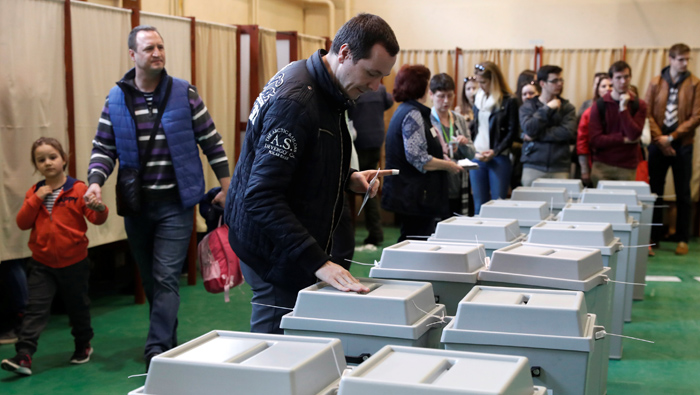
Budapest/Gyongyos (Hungary): Hungarian Prime Minister Viktor Orban launched a last-ditch effort to mobilise supporters on Sunday as interim turnout in the parliamentary election reached its highest since 2002, a vote that consigned him to eight years in opposition.
After an acrimonious campaign in which rightwing nationalist Orban projected himself as a saviour of Hungary's Christian culture against Muslim migration into Europe, all opinion polls put his Fidesz party well ahead.
A strong victory could embolden him to put more muscle into a Central European alliance against the European Union's migration policies. Orban, Hungary's longest-serving post-communist premier, opposes deeper integration of the bloc.
Interim data at 1100 GMT showed voter turnout at 42.3 per cent, the highest since 2002, under a different election system, when final turnout reached 73.5 per cent.
Turnout at the 2014 vote was 61.7 per cent.
Reuters correspondents saw long lines of voters at several polling stations.
Some pollsters said voter turnout above 70 per cent could signal that the opposition was mobilising supporters efficiently, which may cause Fidesz to lose its parliamentary majority.
Orban has far-right admirers across Europe who like his tough line on migrants and a landslide win would show his decision to run a single-issue campaign, arguing migration posed a security threat, had paid off.
Critics say Orban has put Hungary on an increasingly authoritarian path and his stance on immigration has fuelled xenophobia.
After casting his vote in a wealthy district of Budapest, Orban said: "From here I will go and take part in mobilising voters ... I am asking everyone to take part in the election."
Asked by journalists if he was fighting the European Union, Orban said: "The EU is not in Brussels. The EU is in Berlin, in Budapest, in Prague and in Bucharest."
He reiterated he would stand up for Hungary's interests and said Hungary was a loyal member of international organisations.
"We love our country and we are fighting for our country."
Orban posted several updates on his Facebook page on Sunday, the latest showing him campaigning in a Budapest district.
A strong win for Orban would also boost other right-wing nationalists in Central Europe, in Poland and in neighbouring Austria, and expose cracks in the 28-nation EU.
While Fidesz led all opinion polls before the vote, there is a small chance that the fragmented opposition could strip Fidesz of its parliament majority if voters frustrated with Orban's policies choose tactical voting in the 106 constituencies.
The strongest opposition party is former far-right Jobbik, which has recast its image as a more moderate nationalist force.
It has been campaigning on an anti-corruption agenda and urged higher wages to lure back hundreds of thousands of Hungarians who had left Hungary to earn a better living in western Europe.
Clad in a green summer jacket and white shirt, Jobbik leader Gabor Vona, 39, arrived to vote in the eastern city of Gyongyos, his home town and the district where he is likely to win a seat.
"Everyone should go to vote because this election determines Hungary's course not for four years but for two generations at least," he told reporters.
"Emigration may or may not define Hungary, and I would prefer that it does not."
Socialist candidate for prime minister Gergely Karacsony also urged Hungarians to vote, saying higher turnout would probably favour opposition parties, state news agency MTI reported.
The EU has struggled to respond as Orban's government has used its two landslide victories in 2010 and 2014 to erode democratic checks and balances, by curbing the powers of the constitutional court, controlling the media and appointing loyalists to key positions.
Orban is credited with keeping the budget deficit under control, reducing unemployment and some of Hungary's debt, and putting its economy on a growth track.
On Friday, at his closing campaign rally, Orban vowed to protect his nation from Muslim migrants, saying: "Migration is like rust that slowly but surely would consume Hungary."
The anti-immigrant campaign has gone down well with around two million core voters of Fidesz.
"My little daughter must be my primary concern, to make her future safe. Safety is first," said Julia Scharle, 27, holding her child outside the voting district where Orban cast his vote.
She would not reveal her voting preference. In March the government gave pre-election handouts to millions of families and pensioners.
A poll by Zavecz research institute published on Friday showed Fidesz had 46 per cent support among decided voters, while Jobbik had 19 per cent.
The Socialists came in third with 14 per cent.
Voter turnout was estimated between 64 and 68 per cent.
However, one-third of voters are undecided and many hide their voting preference.
In 2014, Fidesz won a two-thirds majority in the 199-seat parliament with 133 seats.
That looks less likely now. If Orban wins, he is expected to carry on his economic policies, with income tax cuts and incentives to boost growth. His business allies are expected to expand their economic domains.
Businessmen close to Fidesz have acquired stakes in major industries like banking, energy, construction and tourism, profiting from EU funds. "Only a dramatic outcome of the election would force a significant shift in the direction of policymaking," Barclays said in a note.
It said pragmatism was likely to prevail given the importance of EU structural funds for Hungary which would probably avoid an all-out conflict with the EU.